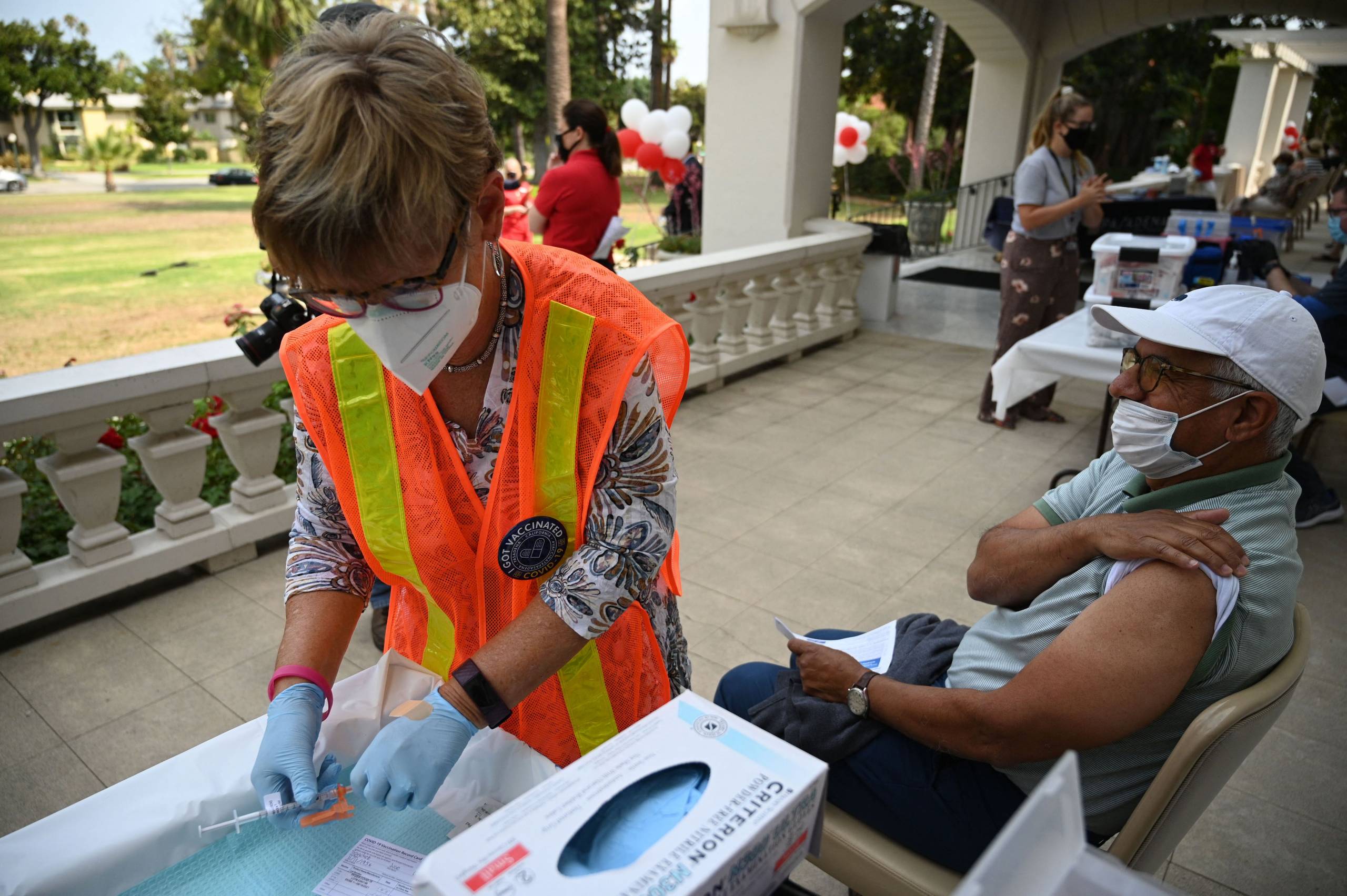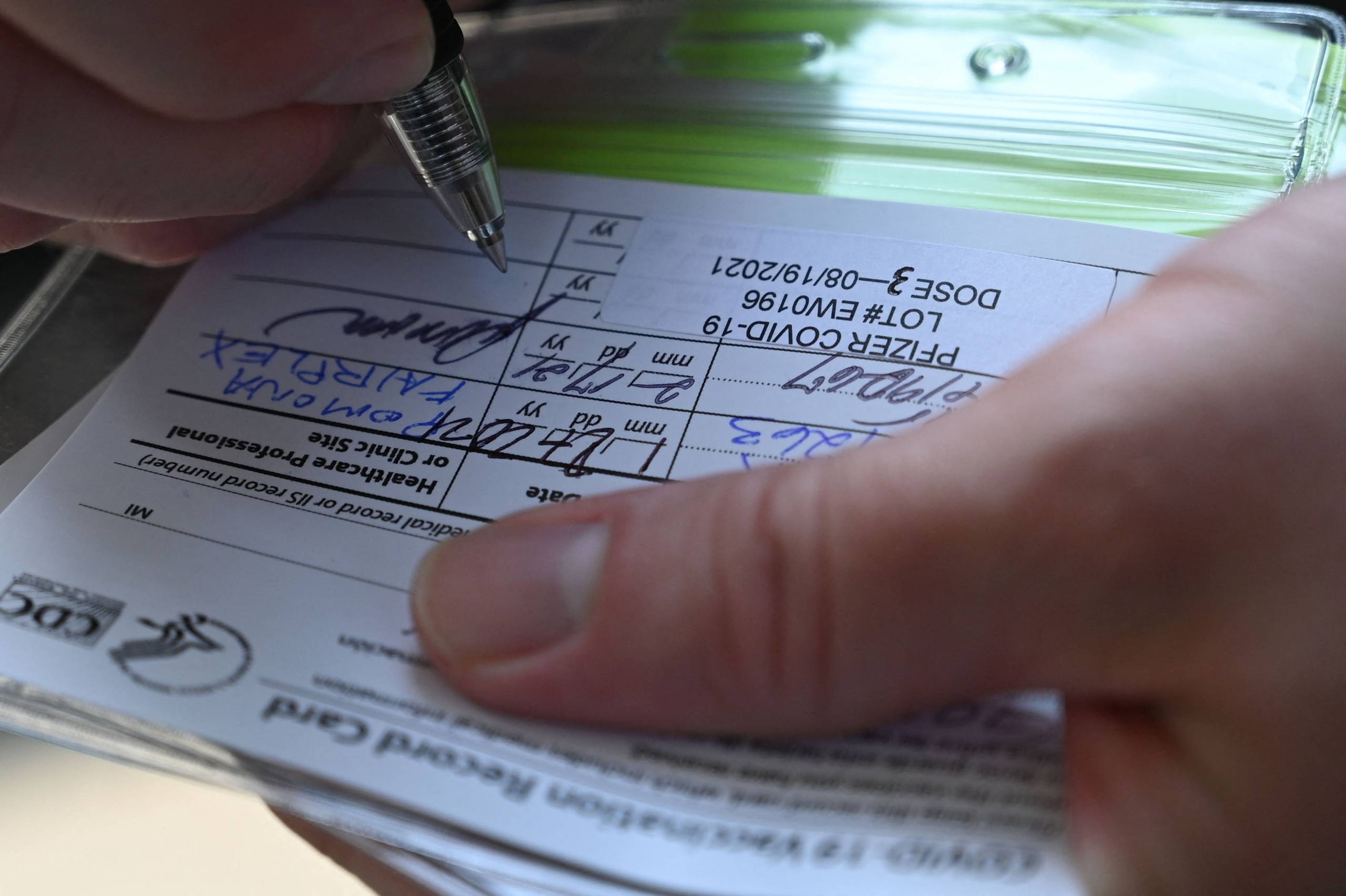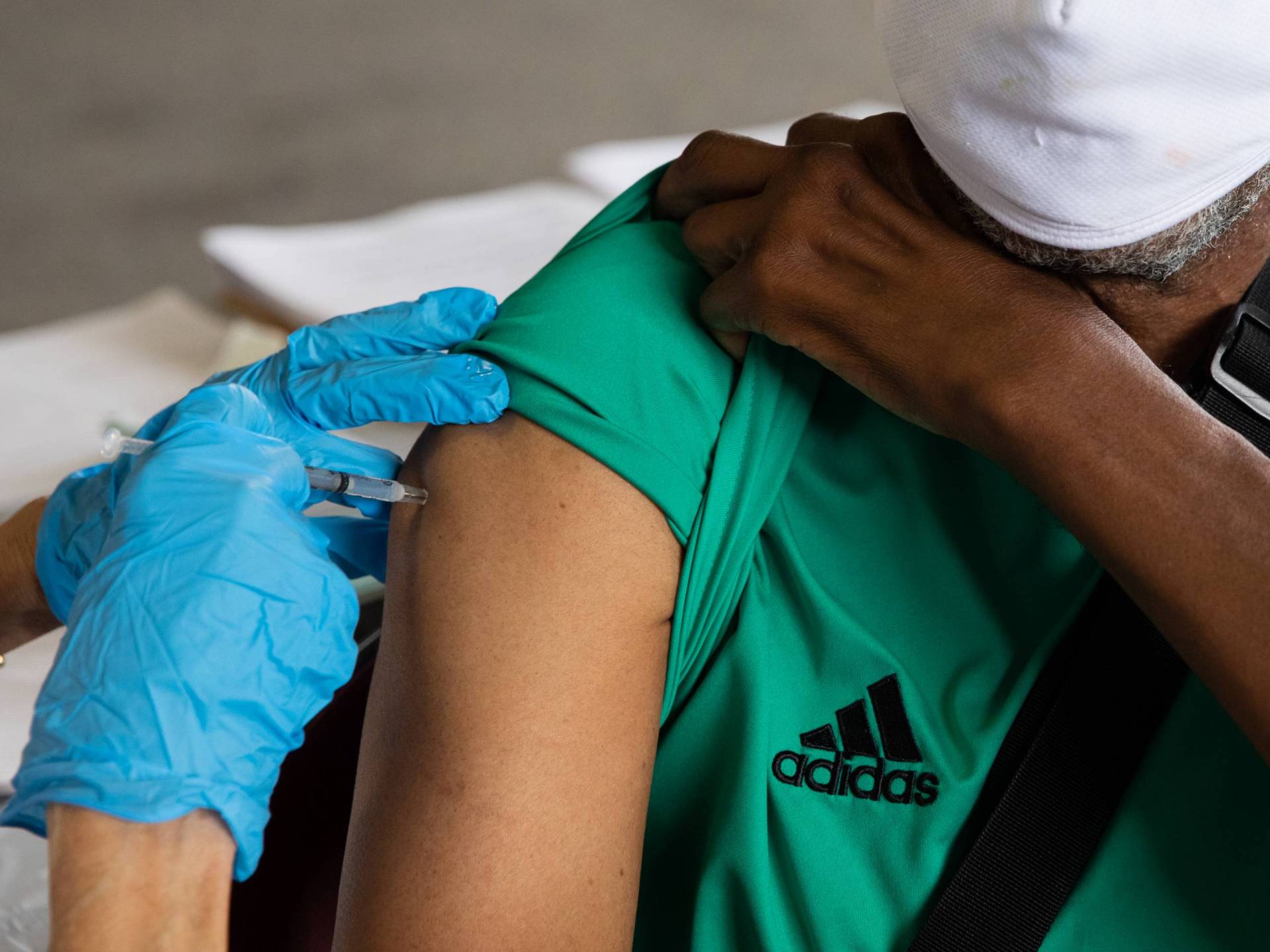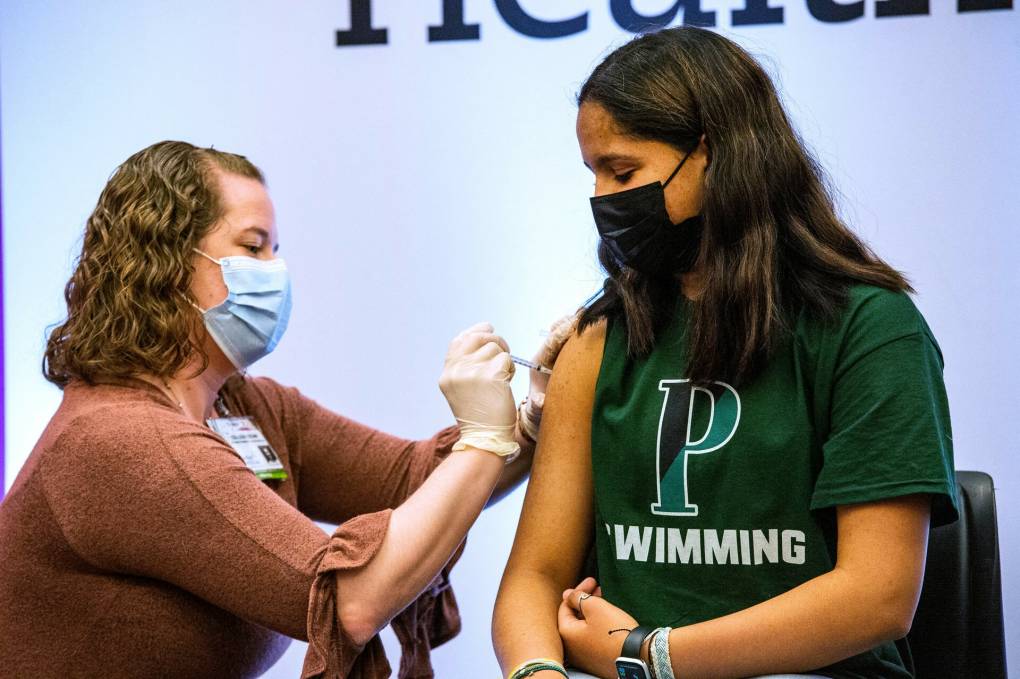Updated Thursday, Jan. 6
What to know about COVID vaccine boosters if your first vaccine was:
Moderna booster shots, Pfizer booster shots and Johnson & Johnson booster shots of the COVID-19 vaccine are now available, following a thorough in-depth review process from the Food and Drug Administration and the Centers for Disease Control and Prevention.
All eligible people in the United States are now being urged to get their booster shots in light of the omicron variant. Boosters were originally recommended only for certain groups. But now, everyone in California age 18 and over is being urged to get a COVID booster shot this winter — and the CDC approved the same expansion nationwide.
The most recent developments on COVID boosters are around the Pfizer booster shot specifically. The CDC has now authorized Pfizer COVID booster shots for kids age 12-15 at least five months after their last shot. The CDC also has officially reduced the amount of time it recommends for everyone to get a Pfizer booster shot after their last Pfizer vaccine dose, to five months down from six. Read more about Pfizer booster shots.
Skip to:
Keep reading for what you need to know about every COVID booster shot. And remember, whichever shot you get, your initial COVID vaccine or your vaccine booster shot will always be free. You do not need health insurance to be vaccinated. You also will not be asked for proof of citizenship or about your immigration status. Getting a COVID vaccine does not make you a public charge and won’t affect any current or future green card applications.
Can I “mix and match” COVID vaccines for my booster shot?
Booster shots for all three COVID vaccines being used in the United States are available — and you can “mix and match” brands.
The CDC says that you can go ahead and choose which vaccine to get for your booster dose. “Some people may have a preference for the vaccine type that they originally received, and others may prefer to get a different booster,” says the CDC.
So, should you mix and match your booster? The CDC and the FDA are basically leaving the choice to you — and isn’t (yet) telling Americans which possible vaccine-and-booster combinations might be best.
“It’s generally recommended that you get the booster that is the original regimen that you got in the first place,” White House chief medical adviser Dr. Anthony Fauci told CNN. But he also confirmed that mixing and matching was entirely possible “for one reason or other — and there may be different circumstances with people, availability or just different personal choices.”
Whatever you decide to do, make sure that you not only check whether you’re eligible to receive a booster, but that enough time has passed between your first shot(s) to get your booster.
Keep reading for the exact time period you need to wait after getting a Pfizer, Moderna or J&J vaccine to get a booster. And remember: COVID booster shots are only available to people age 18 and older, even though young people age 12 and older can get Pfizer for their first two doses.

I got the Johnson & Johnson COVID vaccine. Am I eligible for the Johnson & Johnson booster?
The full name of the J&J vaccine is the Johnson & Johnson/Janssen COVID-19 vaccine.
Unlike the Pfizer and Moderna boosters, which were originally only offered to certain groups, everyone age 18 and over who got the Johnson & Johnson single-shot vaccine is eligible to get a Johnson & Johnson booster.
If that’s you, you can get a Johnson & Johnson booster shot at least two months after your first dose of the Johnson & Johnson vaccine.
Because the CDC allows mixing-and-matching of COVID boosters, if you originally got the Johnson & Johnson vaccine you can get a Johnson & Johnson booster shot, or choose to get a Pfizer booster shot or a Moderna booster shot instead.
I got the Moderna COVID vaccine. Am I eligible for the Moderna booster?
Moderna COVID vaccine booster shots are available for people age 18 and over at least six months after their second dose of the Moderna vaccine. The Moderna booster shot is half the dose of the shots given in the original vaccination series.
Because the CDC allows mixing-and-matching of COVID boosters, if you originally got the Moderna vaccine, you can get a Moderna booster shot, or choose to get a Pfizer booster shot instead. You could also get a Moderna booster shot if you got Pfizer initially.
The federal endorsement of Moderna booster shots was originally split into two types: people whom the FDA and CDC say should get a booster shot, and people whom those agencies say may get one if they want one. (The Pfizer booster shots had the same eligibility groups as the Moderna booster shots.)
But now, the CDC recommends booster shots for everyone age 18 and over, especially those age 50 and over.

I got the Pfizer COVID vaccine. Am I eligible for the Pfizer booster?
Pfizer COVID vaccine booster shots are now available to everyone age 12 and over at least five months after their second dose of the Pfizer vaccine. (The previously recommended time to wait for a Pfizer booster was at least six months.)
You may see the Pfizer-BioNTech COVID-19 vaccine also referred to as Comirnaty. This is the brand name of this particular vaccine.
Because the CDC allows mixing-and-matching of COVID boosters, if you originally got the Pfizer vaccine, you can get a Pfizer booster shot, or choose to get a Moderna booster shot instead. You could also get a Pfizer booster shot if you got Moderna initially.
The federal endorsement of Pfizer booster shots was originally split into two types: people whom the FDA and CDC say should get a booster shot, and people whom those agencies say may get one if they want one. (The Moderna booster shots had the same eligibility groups as the Pfizer booster shots.)
But now, the CDC recommends booster shots for everyone age 18 and over, especially those age 50 and over. The CDC has now authorized Pfizer COVID booster shots for kids age 12-15 at least five months after their last shot.
Where can I find a Moderna, Johnson & Johnson or Pfizer booster shot near me if I’m eligible?
Don’t assume you’ll be proactively contacted about getting your COVID-19 vaccine booster.
Remember that a certain location may only be offering a certain type of booster, whether that’s Moderna, Pfizer or J&J. Make sure that the location you’re walking into or making an appointment for offers the type of vaccine you need or want. Read more about “mixing and matching” COVID vaccines boosters.
Make sure that enough time has passed between your first shot(s) and your booster. When you’re making an appointment for a booster shot, you’ll likely be asked for the date of your last COVID vaccine dose, to ensure you’re not getting your booster shot too soon.
Demand for booster shots may be higher as Thanksgiving and the December holidays approach. So if you’re having difficulty finding an appointment for a booster shot near you, keep trying a mix of the following routes:
1. Find a Moderna, Johnson & Johnson or Pfizer booster shot through My Turn.
My Turn is the state’s tool that allows Californians to schedule vaccination appointments, as supplies allow. You can also try to find a walk-in appointment through My Turn.
Visit the My Turn page and select “Make an Appointment.” My Turn will ask you for your information, and then for a ZIP code or location you’d like to use to search for vaccine appointments. You can give your home location, or you can input other locations to see which sites are available farther from your home.
When you find and schedule an appointment for a vaccination site through My Turn, the California Department of Public Health says you don’t necessarily need to be a resident or a worker in that particular county where the vaccination site is based. So don’t worry if My Turn is suggesting appointments in a county other than the one where you live or work.
If you can’t travel to a clinic for your booster shot because of health or transportation issues, you can note this when registering on My Turn, and representatives from the California Department of Public Health will call you to arrange an in-home visit or transportation.
If you’re trying to find an appointment at a certain location and can’t see it in the search results, try searching on My Turn for that site’s exact ZIP code, rather than your own. Remember that if you’re not seeing a specific site in the search results, it might just be because of low supply or lack of available appointments. You’ll also be shown a lot of pharmacy results: Keep scrolling through them to make sure you’re not missing clinic results hidden among them.
My Turn will ask you to provide a cellphone number and an email address. The state says this is so you can use two-factor authentication to doubly confirm your identity and make your appointment, and to prevent bots from automatically scooping up available appointments online.
If you don’t have an email address or a cellphone number, or you have questions, you can call the California COVID-19 hotline at (833) 422-4255 (Monday-Friday 8 a.m.-8 p.m., Saturday and Sunday 8 a.m.-5 p.m PT) and sign up over the phone. Both English-speaking and Spanish-speaking operators are available. Callers needing information in other languages will be connected to a translation service that offers assistance in over 250 languages.

2. Find a Moderna, Johnson & Johnson or Pfizer booster shot through your county.
Visit your county’s public health website to learn how your county is vaccinating its residents. If the county you work in is different from your county of residence, it’s also likely you can get vaccinated there. The availability of vaccination appointments will be based on the doses that the state has supplied to your county.
You can also sign up to receive notifications via email from your county to know when there is greater appointment availability. Find your Bay Area county in our list.
3. Find a Moderna, Johnson & Johnson or Pfizer booster shot through your health care provider.
If you have health insurance, check with your provider to see whether they can offer you your booster shot. If you don’t have health insurance but get medical care through a city- or county-run provider, you can check with that location.
As well as trying to talk with your health care provider directly, check the website of your provider to see whether they’re offering the ability to make appointments, and sign up for their vaccine notifications if they’re offering them.
4. Find a Moderna, Johnson & Johnson or Pfizer booster shot through a local pharmacy.
Several pharmacy chains are offering online appointments for the coronavirus vaccine booster, and some also offer walk-in boosters with no appointment:

